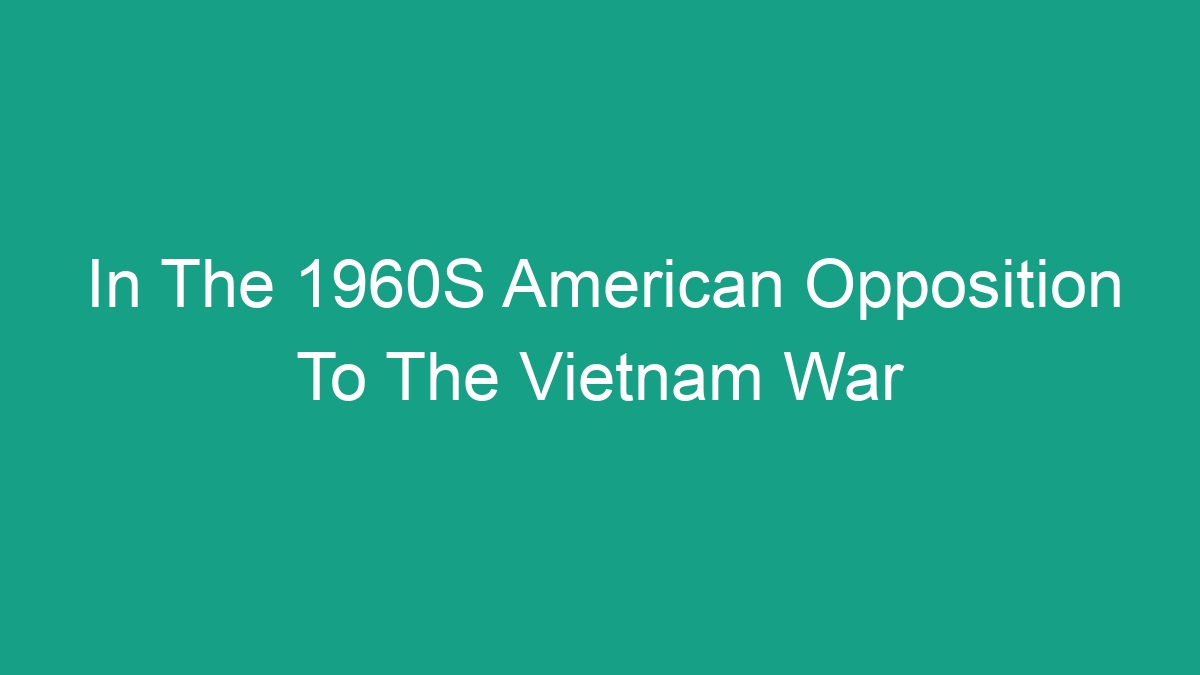
The Vietnam War was a deeply divisive conflict, and American opposition to it was particularly prominent during the 1960s. This opposition took many forms, from peaceful protests to more radical demonstrations. Here, we’ll explore the various ways in which Americans opposed the Vietnam War during this tumultuous decade.
1. Peaceful Protests
Peaceful protests were a central part of the anti-war movement in the 1960s. Organizations such as Students for a Democratic Society (SDS) and the Student Nonviolent Coordinating Committee (SNCC) organized marches, sit-ins, and rallies to express their opposition to the war. These protests often drew large crowds and garnered significant media attention, helping to galvanize public opinion against the war.
2. Civil Disobedience
In addition to peaceful protests, many Americans engaged in civil disobedience as a form of opposition to the war. This included acts of nonviolent resistance, such as refusing to comply with the draft or engaging in sit-ins at government offices. Civil disobedience was a powerful tool for drawing attention to the moral and ethical implications of the war, and it inspired many others to join the anti-war movement.
3. The Counterculture Movement
The counterculture movement of the 1960s was deeply intertwined with opposition to the Vietnam War. Through music, art, and literature, countercultural figures such as Bob Dylan, Joan Baez, and Allen Ginsberg brought anti-war sentiments to a wider audience. The counterculture movement emphasized peace, love, and nonconformity, all of which stood in stark contrast to the aggression and conformity associated with the war.
4. Political Activism
Many Americans channeled their opposition to the Vietnam War into political activism by supporting anti-war candidates, lobbying government officials, and participating in grassroots campaigns. Organizations like the National Mobilization Committee to End the War in Vietnam and Women Strike for Peace played a crucial role in organizing and mobilizing anti-war sentiment at the political level.
5. Veterans’ Resistance
Veterans’ resistance was a unique and powerful form of opposition to the Vietnam War. Many soldiers who had served in Vietnam returned home disillusioned and traumatized by their experiences. Some formed organizations such as Vietnam Veterans Against the War (VVAW) to speak out against the war and advocate for peace. Their firsthand accounts of the true cost of the conflict were a sobering reminder of its human toll.
6. Impact on Public Opinion
The diverse forms of opposition to the Vietnam War in the 1960s had a significant impact on public opinion. As the anti-war movement gained momentum, polls showed a growing number of Americans questioning the legitimacy and morality of the war. This shift in public sentiment played a key role in pressuring the government to reconsider its approach to the conflict.
7. Enduring Legacy
Although the Vietnam War officially ended in 1975, the legacy of American opposition to the war in the 1960s continues to resonate today. The anti-war movement of this era set a precedent for grassroots activism and political engagement, and its influence can be seen in subsequent movements for peace and social justice.
Frequently Asked Questions
Q: Why did Americans oppose the Vietnam War in the 1960s?
A: Americans opposed the Vietnam War for a range of reasons, including moral objections to the conflict, concerns about the human cost of war, and skepticism about the government’s justifications for military intervention.
Q: What role did the media play in shaping opposition to the war?
A: The media played a crucial role in shaping opposition to the war by covering protests, documenting the experiences of soldiers, and presenting alternative perspectives on the conflict. This coverage helped to raise awareness and foster public debate about the war.
Q: How did opposition to the Vietnam War influence subsequent anti-war movements?
A: The opposition to the Vietnam War in the 1960s laid the groundwork for subsequent anti-war movements by demonstrating the power of grassroots activism, civil disobedience, and political engagement in effecting change. It also inspired a new generation of activists to mobilize against future military interventions.
In conclusion, American opposition to the Vietnam War in the 1960s was a multifaceted and influential movement that left an indelible mark on the nation’s history. By engaging in peaceful protests, civil disobedience, political activism, and cultural resistance, Americans played a pivotal role in shaping public opinion and ultimately bringing an end to one of the most contentious conflicts of the 20th century.



